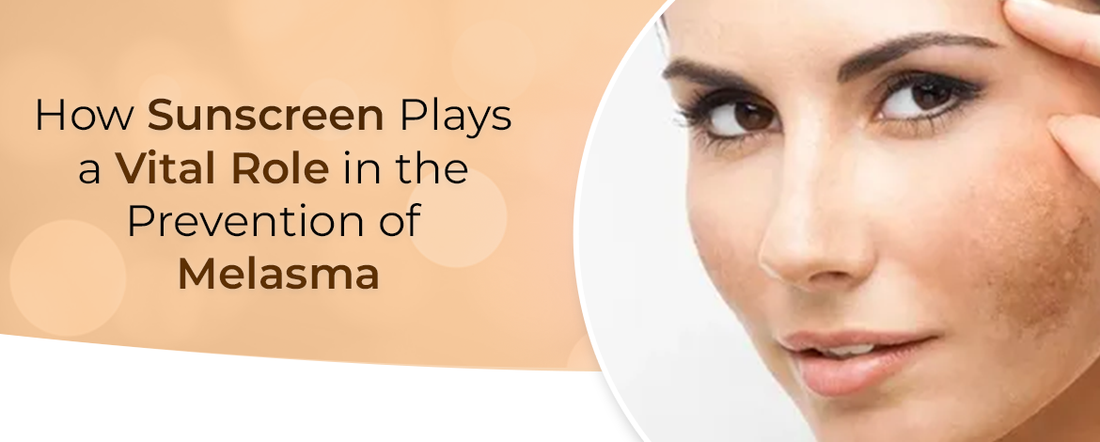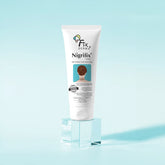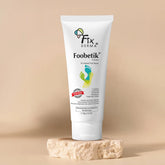How Sunscreen Plays a Vital Role in the Prevention of Melasma

Melasma, also known as "the mask of pregnancy," is a common skin condition characterised by dark, irregular patches on the face, particularly on the cheeks, forehead, nose, and upper lip. It affects millions of individuals worldwide, particularly women and those with darker skin tones. The condition is not only a cosmetic nuisance but also affects self-esteem and quality of life. Untreated melasma can worsen over time, making it difficult to manage. Melasma also poses risks to skin health, as hyperpigmented areas are more prone to sun damage and can worsen other skin issues like acne or rosacea. Prolonged sun exposure without adequate protection can lead to the worsening of melasma, making prevention important.
Proper sunscreen use is a crucial preventive step in managing melasma effectively. It acts as a powerful defence against the underlying causes of melasma. By understanding how sunscreen works and incorporating it into our daily skincare regime, we can significantly reduce the risk of melasma development and recurrence. Sunscreen is not just a cosmetic accessory; it's a potent weapon in our skincare routine. By studying the specifics of SPF and sunscreen compositions, as well as how UV radiation causes melasma, we can prepare ourselves with the knowledge necessary to protect our skin from this challenging condition.
Let’s Get To Know Melasma
Melasma is a dermatological condition characterised by dark, irregular patches on the skin, typically on the face. These patches, usually brown or greyish, can be seen on various facial areas, including the cheeks, forehead, nose, upper lip, and sometimes even the neck. Melasma is a complex condition that develops over time due to factors such as prolonged exposure to UV radiation, hormonal changes, and genetics.
The primary cause of melasma is sun exposure, which stimulates the production of melanin, the pigment responsible for skin colouration, leading to the formation of dark patches on the skin's surface. Hormonal changes, particularly during pregnancy or while taking hormonal contraceptives, can also trigger melasma. Melasma is often referred to as the mask of pregnancy, as it commonly occurs in expectant mothers due to fluctuations in estrogen and progesterone levels.
Genetics also play a significant role in predisposing individuals to melasma, with a family history of the condition increasing the likelihood of developing it. Melasma most commonly occurs on certain areas of the face, such as the cheeks, forehead, nose, and upper lip, which form distinct patterns almost like a mask.
Sunscreen Works as a Preventive Measure Against Melasma
Sunscreen is a vital preventive measure against melasma, acting as a skin shield against the harmful effects of the sun. Its primary function is to block or absorb ultraviolet (UV) radiation, which is the primary cause of melasma development. Sunscreen's active ingredients form a protective barrier between the skin and the sun's harmful rays, minimising the skin's exposure to UV radiation and reducing the risk of melanin production and dark patches.
Ultra-active ingredients in sunscreen include UV filters, such as zinc oxide and titanium dioxide. These mineral-based ingredients effectively reflect and scatter UV radiation away from the skin, blocking its harmful effects. Unlike chemical sunscreens, which absorb UV radiation and convert it into heat, mineral sunscreens provide broad-spectrum protection without causing irritation or sensitivity. Broad-spectrum protection against UVA and UVB rays is essential for safeguarding the skin against sun damage. UVB rays cause sunburns and skin cancer, while UVA rays penetrate deeper into the skin, triggering melanin production and contributing to photoaging and pigmentation disorders like melasma.
Including sunscreen into your daily skincare routine and choosing formulations with high-quality UV filters and broad-spectrum protection is a proactive step towards saving your skin's health and beauty for years to come. Wearing sunscreen ensures that your skin is shielded from the sun's harmful rays, reducing the risk of melasma development and other sun-induced skin damage.
How Sunscreen Prevents Melasma
Sunscreen, a key component in the fight against melasma, forms a barrier on the skin's surface, intercepting and neutralising UV radiation before it can damage the skin cells. Mineral sunscreens, such as those containing zinc oxide or titanium dioxide, act as physical barriers, reflecting and scattering UV rays away from the skin. Chemical sunscreens absorb UV radiation, converting it into harmless heat energy. The Sun Protection Factor (SPF) is a key factor to consider when choosing sunscreen. A higher SPF value provides greater protection against UVB radiation, which is the primary cause of sunburn and a contributing factor to melasma. However, SPF alone doesn't provide complete protection against UV radiation. Opting for a broad-spectrum sunscreen offers protection against both UVA and UVB rays, addressing the full spectrum of sun-induced skin damage, including melasma.
Sunscreen plays an important role in preventing melasma by providing active protection against UV radiation. Understanding how UV exposure triggers melanin production and leveraging sunscreen's protective properties can help maintain skin clarity and radiance.
Choosing the Right Sunscreen
Selecting the right sunscreen for melasma-prone skin is crucial for its health and clarity. It's not just a matter of preference; it's a strategic decision that can significantly impact skin health. Melasma-prone skin requires special attention, making it essential to choose a sunscreen formulation tailored to its specific needs. The primary goal of sunscreen is to provide robust sun protection while minimising the risk of melasma triggering or exacerbating. Choosing broad-spectrum protection against both UVA and UVB rays is absolutely non-negotiable.
Factors to Consider: SPF Level, Texture, and Additional Features
Let's now explore the key factors to take into account while choosing the best sunscreen for melasma-prone skin:
- SPF Level
SPF, or Sun Protection Factor, indicates a sunscreen's ability to protect against UVB radiation—the primary culprit behind sunburn and a contributing factor to melasma. For melasma-prone skin, experts recommend opting for a sunscreen with a minimum SPF of 30 or higher to ensure adequate protection against UVB rays.
- Texture
The texture of sunscreen plays a crucial role in its efficacy and user experience. For melasma-prone skin, lightweight and non-comedogenic formulations are preferred to avoid clogging pores and exacerbating skin congestion. Gel or lotion-based sunscreens are excellent options for those with oily or acne-prone skin, as they provide a matte finish without feeling heavy or greasy. Conversely, cream-based sunscreens are ideal for dry or sensitive skin, offering nourishing hydration and a comfortable feel on the skin.
- Additional Features
Beyond sun protection, many sunscreens offer additional features tailored to specific skin concerns. For melasma-prone skin, look for sunscreens enriched with ingredients like niacinamide, vitamin C, or antioxidants, which help to brighten the skin, even out tone, and combat pigmentation. Additionally, formulations with oil control properties can help to mattify the skin and reduce shine, while hydrating sunscreens provide essential moisture to dry skin.
Fixderma offers a range of sunscreens designed to cater to the unique needs of melasma-prone skin. The range includes lightweight gels for oily or acne-prone skin and nourishing creams for dry or sensitive skin. These sunscreens provide high SPF levels for robust sun protection and broad-spectrum coverage to shield the skin from both UVA and UVB rays. They are infused with skin-loving ingredients for oil control, hydration, and anti-ageing benefits. FixDerma's sunscreens help users protect their skin from harmful rays and promote radiant, healthy skin.
Incorporating Sunscreen into Your Skincare Routine
Sunscreen is a crucial component of your skincare routine, especially for those with melasma-prone skin. To ensure maximum protection, follow these steps:
Other Preventive Measures
To protect your skin from the effects of melasma, consider wearing protective clothing, hats, and sunglasses. Wear lightweight, long-sleeved shirts and pants made from tightly woven fabrics, and accessorize with a wide-brimmed hat to protect your face, neck, and ears. Wear UV-protective sunglasses to safeguard your eyes and delicate skin. Avoid known triggers such as certain medications and skin care products, which can increase skin sensitivity to UV radiation and exacerbate pigmentation disorders like melasma. Consult with your healthcare provider or dermatologist to identify potential triggers and make informed decisions about your skincare regimen.
Including these strategies into your daily routine, can further enhance your skin's protection against melasma and other sun-induced skin damage.
Addressing Common Misconceptions
There are many misconceptions in the skincare industry regarding sunscreen, but it's time to clarify them. First of all, sunscreen needs to be applied every day because UV radiation can pass through windows and clouds. Second, to protect yourself from UVB and UVA radiation, use broad-spectrum sunscreen instead of SPF alone. Don't limit your sunscreen application to once a day; frequent reapplication is essential for the best possible protection. In addition, everyone should use sunscreen to avoid melasma and other sun-related damage, regardless of skin tone. Finally, there is little evidence to support the myth that wearing sunscreen causes a lack of vitamin D. Even when wearing sunscreen, one can still obtain sufficient amounts of this vital vitamin by eating a balanced diet and getting some sun exposure.
In the fight against melasma, sunscreen proves to be an effective partner in achieving beautiful and healthy skin. Sunscreen is necessary for preventing pigmentation problems and sun-induced damage to our skin because it forms a protective barrier against dangerous UV rays. As we've seen, using sunscreen regularly is not only advised but also important to maintaining the health and vibrancy of our skin. So let's commit to include sun protection in our daily routine regardless of the weather. We are investing in the long-term health and beauty of our skin when we use sunscreen daily. Fixderma offers a variety of sunscreens that are precisely developed to meet the needs and preferences of a wide range of skin types, making it a perfect match for anyone looking for sunscreen.








